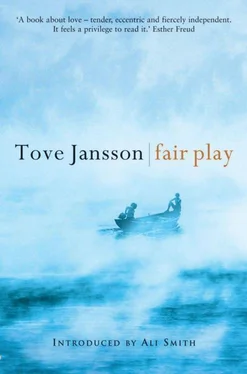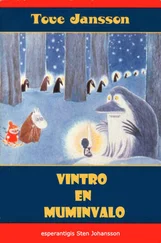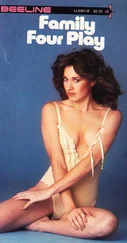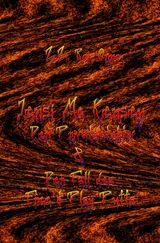“Forget it,” said Jonna. “Forget it. Don’t grieve for a net, grieve for everything else that’s broken and can’t ever be mended. Your uncle liked making nets; it was what he knew, it was calming and familiar. Going into that loft you’ve talked about. I’m sure it helped him shut everything out, and everyone. He wasn’t thinking about fish, not a bit, and not about you getting the net as a present. He was just at peace, doing work that was his and only his. You know I’m right. He didn’t have goals any more.”
“To hell with goals,” Mari said. “What I’m talking about is desire, about having to.”
“Having to what?”
“I think you know.”
“And then what? Those pictures. They drown. They drown and get lost among millions of other pictures. And most of them are completely unnecessary — and, what’s more, pretentious.” Jonna added a little more quietly, “I mean other people’s. Most of them.”
The storm came nearer, a huge alien backdrop making its steady way across the water, never before seen in such splendour and maybe never to be repeated. The sky moved toward them in a finely drawn curtain of local thunder showers, each with its own delicate drapery. The light turned subterranean and yellow, the shallows had gone Bengali green. Very soon, it would all be nothing but grey rain.
“Take care of the boat,” Jonna shouted, jumping ashore. She ran up to the cottage.
Mari tied up Viktoria , two lines on the north side and two on the south. She walked up to the top of the island and saw that the curtain of rain was coming closer, albeit slowly. Jonna would have plenty of time to make her crucial first sketch.
BACK NEAR THE TURN OF THE CENTURY, Mari’s mother had helped start the Girl Scouts in Sweden. The girls admired her, of course, but from one very small Scout named Helga she got absolute, unqualified adoration. Helga was as quiet as a mouse and afraid of practically everything. Mari’s mother could see that Helga would never under any circumstances become a good scout, and she therefore tried as quietly as possible to protect the child from the simple hardships that might only increase her terror.
Helga’s greatest phobia was thunderstorms. When the thunder rolled nearer, Mari’s mother would find the unfortunate child and try to calm her with whatever explanations she could come up with — sudden temperature changes, electrical charges, updraughts and downdraughts. It is not certain that Helga understood, but it did make her feel better.
Helga had a camera that she carried wherever her beloved Scout leader took her. She pasted the photographs into a scrapbook that she never showed to anyone. It was her secret treasure, a barricade against a dangerous world. On the first page, she’d pasted in a little lock of hair under cellophane. After a great deal of planning and anxiety, she had clipped off the uttermost tip of her Scout leader’s majestic braid.
Remarkably, Helga never looked up her idol after her scouting years, never even sent the inevitable Christmas cards that give the recipient an annual rush of holiday sentimentality or, more often, a twinge of bad conscience. On the other hand, Helga did continue with the Scrapbook, pasting in, as time went by, wedding and birth announcements and everything else that concerned her Friend. The chapter she’d entitled “First and Foremost an Artist” dealt with her participation in art exhibitions and included newspaper reviews, several reproductions and a couple of interviews. The family surrounding her Friend received only that narrow margin of interest that could not be avoided. The Scrapbook ended with an obituary and a poem in which Helga attempted to express all the feelings she had never uttered.
Many years later, Helga happened to see a notice in her morning paper. The early works of several artists were to be auctioned off, and there was a list of names. Helga bought a collection of drawings and watercolours Mari’s mother had done during her earliest years as a student. She framed them nicely, hung them, photographed them, and put the pictures in the Scrapbook, which was now complete and perfect.
That summer, for some reason, this perfection came to feel like a burden. Helga decided to shift her protracted responsibility to another altar, and so she wrote to Mari. The material she’d collected was too valuable to send by post, she would have to deliver it in person, and the sooner the better.
Mari read the letter and walked around the island for a while, slowly. When she came back, Jonna said, “We can always sleep in the tent. And it will only be for a couple of days?”
“Yes. I’m sure it’ll be only a couple of days.”
Brunström’s island taxi put Helga ashore on a June evening. She greeted them quietly and solemnly as if at a funeral. Helga was still short, but she had grown in girth. Her face bore an expression of reserved obstinacy. They walked up to the cottage, where a fish soup stood ready on the stove, and had a hard time getting a conversation started. Helga did not want to unpack. “Tomorrow,” she said. “Tomorrow is Her birthday.”
In the tent, Jonna observed that Helga had brought an awful lot of luggage.
“Yes,” Mari said. “Let’s read for a while.”
The cat came in to go to bed.
The next morning, Helga’s Scrapbook lay in the middle of the table. The cover was decorated with a scout emblem in gold. She had lit a candle that burned with an invisible flame in the sunlight.
“Now you should sit down,” Helga said. “Mari, here is the book of her life.” And she began her narrative. Solemnly, in detail, she told of all the expectations and disappointments she’d experienced in the course of her long, patient effort to give Mari’s mother her rightful place in the sacred garden of memory. The photographs were overexposed and faded. Shadowy, barely visible figures did things that evidently mattered to them. But Helga described and explained everything that had occurred.
“Mari, turn to page twenty-three. Did you know that your mother took first prize in block lettering in 1904? I’ll read from the school’s annual report… Did you know that she was an accomplished marksman? Page twenty-nine. First prize in Stockholm 1908 and second prize in Sundsvall 1907. And did you know that in 1913 she left scouting? And why?”
“I know, “Mari answered. “It had become over-organised and she was tired of it all.”
“No, no. She wasn’t tired. She surrendered her mantle in order to devote herself entirely to Art. Turn to page forty-five…”
“Excuse me,” Jonna said. “I think I’ll go out for a while and feed the cat. Wouldn’t you like some coffee?”
“No, thank you,” Helga said. “This is too important.”
A little while later, Mari came rushing out of the cottage. “Did you hear that?” she cried. “The sacred garden of memory! Did you know that my mother had the second-longest hair in Sweden in 1908! That little lock of hair in cellophane makes me sick. She has no right to it!”
“Stop,” Jonna said. “You know what I think? I think you should ask her if you can’t read the rest of that book by yourself, alone. Say it nicely, don’t sound annoyed. Tell her it’s personal and important for you, and then you can go out to the end of the point and she can’t tell if you’re reading it or not.”
“Of course I’ll read it!” Mari burst out. “I can’t not! And why is it any business of yours anyway?”
Jonna said, “Two people on an island can manage, even when things get bad. But three is worse. Mari, she’s not trying to steal your mother. Listen to what I’m saying.”
Mari took Helga’s scrapbook out to the end of the point. It was fine, warm weather with a light breeze from the water.
Читать дальше











